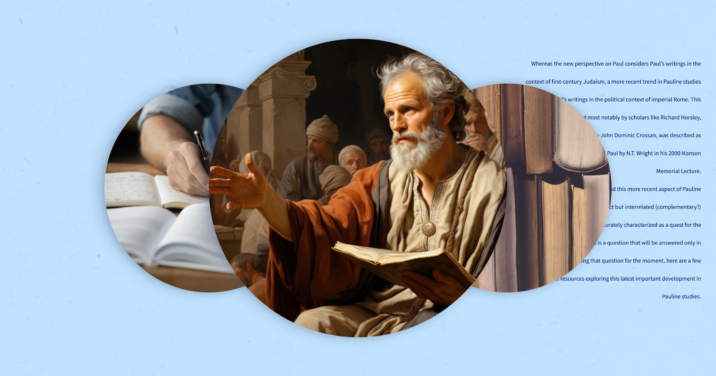This article was originally part of The Paul Page, a site dedicated to academic study of the apostle, with special focus on the work of N.T. Wright.
Whereas the new perspective on Paul considers Paul’s writings in the context of first-century Judaism, a more recent trend in Pauline studies considers Paul’s writings in the political context of imperial Rome. This development, pioneered most notably by scholars like Richard Horsley, Neil Elliott, and more recently John Dominic Crossan, was described as a “fresh” perspective on Paul by N.T. Wright in his 2000 Manson Memorial Lecture.
Might the new perspective and this more recent aspect of Pauline studies be considered two distinct but interrelated (complementary?) aspects of what may be more accurately characterized as a quest for the historical Paul? Perhaps this is a question that will be answered only in hindsight. Bracketing that question for the moment, here are a few helpful resources exploring this latest important development in Pauline studies.
Articles
1 Corinthians Bible Study Index – Reta’s Reflections by Reta Halteman Finger situates Paul’s Corinthian correspondence in its cultural context. (Link added 10/22/12)
Apocalypsis andPolis: Pauline Reflections on the Theological Politics of Yoder, Hauerwas, and Milbank by Douglas Harink argues that Paul’s gospel was intrinsically political. (Link updated 4/15/11)
A Polite Bribe: Paul’s Final Journey to Jerusalem by Robert Orlando is a Huffington Post article about the new documentary, A Polite Bribe. (Link added 5/7/12)
In Search of Paul by John Dominic Crossan is an excerpt from his latest book. (Link added 2/12/05)
My interview with Robert Orlando, director of A Polite Bribe by Mark Goodacre is a video interview. (Link added 6/15/14)
N.T. Wright and New Insights on Paul is a podcast interview of N.T. Wright by Jerry Bowyer. (Link added 4/15/11)
Paul and Caesar: A New Reading of Romans by N.T. Wright is ‘a lightly revised version’ of Wright’s 2000 Manson Memorial Lecture. (Link added 1/24/05)
Paul: Leader of a Jewish Revolution by N.T. Wright is a Bible Review column. (Link added 9/5/05)
Spectres of Paul: An Interview with with Neil Elliott is a recently posted blog post. (Link added 6/14/15)
Bibliography
Crossan, John Dominic and Reed, Jonathan L., In Search of Paul: How Jesus’s Apostle Opposed Rome’s Empire with God’s Kingdom (HarperSanFrancisco), 2004, brings together the latest research in archaeology and Pauline exegesis.
Ehrensperger, Kathy, Paul and the Dynamics of Power: Communication and Interaction in the Early Christ-Movement (London: T&T Clark), 2007, examines Paul’s use of power and authority.
Elliott, Neil, Liberating Paul: The Justice of God and the Politics of the Apostle (Fortress Press), 2005, argues for a liberationist reading of Paul.
Elliott, Neil, The Arrogance of Nations: Reading Romans in the Shadow of Empire (Fortress Press), 2009, incorporates insights from classical studies, rhetorical criticism, postcolonial criticism, and people’s history.
Given, Mark D., ed., Paul Unbound: Other Perspectives on the Apostle (Baker Academic), 2010, includes a wide variety of essays.
Hardin, Justin K., Galatians and the Imperial Cult: A Critical Analysis of the First-Century Social Context of Paul’s Letter (Mohr Siebeck), 2008, assesses the imperial cult as the background for understanding the social setting of Galatians.
Harland, Philip A., Associations, Synagogues, and Congregations: Claiming a Place in Ancient Mediterranean Society (Augsburg Fortress Publishers), 2003, considers the formation, operation, and functions of congregations and synagogues within the larger framework of voluntary associations in the Roman world.
Harrill, J. Albert, Paul the Apostle: His Life and Legacy in Their Roman Context (Cambridge University Press), 2012, argues for Paul’s inclusion in the pantheon of key figures of classical antiquity.
Horsley, Richard A., ed., Paul and Empire: Religion and Power in Roman Imperial Society (Trinity Press International), 1997, emphasizes the Roman imperial context of Paul.
Horsley, Richard A., ed., Paul and Politics: Ekklesia, Israel, Imperium, Interpretation (Trinity Press International), 2002, brings together scholars on the cutting edge of Pauline studies.
Horsley, Richard A. and Silberman, Neil Asher, The Message and the Kingdom: How Jesus and Paul Ignited a Revolution and Transformed the Ancient World (Augsburg Fortress Publishers), 2002, uses both archaeological and textual research in reassessing Jesus and Paul.
Kim, Seyoon, Christ and Caesar: The Gospel and the Roman Empire in the Writings of Paul and Luke (Grand Rapids, MI: Wm. B. Eerdmans Pub. Co.), 2008, questions the new “anti-imperial” hermeneutic.
Kim, Yung Suk, Christ’s Body in Corinth: The Politics of a Metaphor (Fortress Press), 2009, presents a new argument about Paul’s metaphor of the body of Christ in 1 Corinthians.
Longenecker, Bruce W., Remember the Poor: Paul, Poverty, and the Greco-Roman World (Grand Rapids, MI: Wm. B. Eerdmans Pub. Co.), 2010, challenges the widespread notion that Paul had little or no concern for the poor.
Lopez, Davina, Apostle to the Conquered: Reimagining Paul’s Mission (Fortress Press), 2009, provides a new and more critical perspective on the systematic violence of the Roman Empire and a renewed understanding of “Paul’s politics of the new creation.”
Marchal, Joseph, The Politics of Heaven: Women, Gender, and Empire in the Study of Paul (Fortress Press), 2009, argues that understanding the way rhetorics of power overlap and intersect requires a nuanced combination of feminist and postcolonial criticism and a “thick description” of colonized space.
Marchal, Joseph, ed., Studying Paul’s Letters: Contemporary Perspectives and Methods (Fortress Press), 2012, is organized for use in a single semester course on Paul.
Orlando, Robert, Apostle Paul: A Polite Bribe (Cascade Books), 2014, is the companion book to the film.
Stanley, Christopher D., ed., The Colonized Apostle: Paul in Postcolonial Eyes (Fortress Press), 2011, includes essays introducing postcolonial criticism.
Tabor, James D., Paul and Jesus: How the Apostle Transformed Christianity (Simon & Schuster), 2012, argues that Paul was the “second” founder of Christianity.
Walsh, Brian J. and Keesmaat, Sylvia C., Colossians Remixed: Subverting the Empire (InterVarsity Press), 2004, explores the revolutionary and subversive message of Colossians.
Wasserman, Emma, Apocalypse as Holy War: Divine Politics and Polemics in the Letters of Paul (Yale University Press), 2019, examines Paul’s apocalypticism in the broader context of Mediterranean and West Asian religious thought.
Wright, N.T., Paul: In Fresh Perspective (Augsburg Fortress Publishers), 2005, elaborates on his Cambridge University Hulsean Lectures of 2004.
Zetterholm, Magnus, Approaches to Paul: A Student’s Guide to Recent Scholarship (Fortress Press), 2009, surveys not only the new perspective but other recent perspectives as well (including feminist and postcolonial perspectives).
Book Reviews
Appocalypse as Holy War: Divine Politics and Polemics in the Letters of Paul by Emma Wasserman as reviewed by Scot Miller. (Added 6/10/19)
Colossians Remixed: Subverting the Empire by Brian J. Walsh and Sylvia C. Keesmaat as reviewed by Angela Standhartinger in the Review of Biblical Literature. (Link added 3/10/07)
Galatians and the Imperial Cult: A Critical Analysis of the First-Century Social Context of Paul’s Letter by Justin K. Hardin as reviewed by Wilhelm Pratscher in the Review of Biblical Literature. (Link added 4/26/09)
Galatians and the Imperial Cult: A Critical Analysis of the First-Century Social Context of Paul’s Letter by Justin K. Hardin as reviewed by Mark D. Nanos in the Review of Biblical Literature. (Link added 4/26/09)
Paul and Jesus: How the Apostle Transformed Christianity by James D. Tabor as reviewed by Mark M. Mattison. (Added 1/2/13)
Paul and Politics: Ekklesia, Israel, Imperium, Interpretation, ed. by Richard A. Horsley, as reviewed by Robert Paul Seesengood in the Review of Biblical Literature. (Link added 1/23/03)
Paul: In Fresh Perspective by N.T. Wright as reviewed by Valérie Nicolet Anderson in the Review of Biblical Literature. (Link added 7/11/06)
Paul: In Fresh Perspective by N.T. Wright as reviewed by Seyoon Kim in the Review of Biblical Literature. (Link added 7/11/06)
Paul: In Fresh Perspective by N.T. Wright as reviewed by William W. Klein in the Denver Journal. (Link added 6/2/07)
Paul’s Letter to the Philippians: A Socio-Rhetorical Commentary by Ben Witherington III as reviewed by Scot Miller. (Added 5/26/13)
Paul the Apostle: His Life and Legacy in Their Roman Context by J. Albert Harrill as reviewed by Ross P. Ponder in the Review of Biblical Literature. (Link added 2/8/14)
Paul the Apostle: His Life and Legacy in Their Roman Context by J. Albert Harrill as reviewed by James Harrison in the Review of Biblical Literature. (Link added 2/8/14)
Remember the Poor: Paul, Poverty, and the Greco-Roman World by Bruce W. Longenecker as reviewed by Mark M. Mattison. (Added 5/1/11)
The Arrogance of Nations: Reading Romans in the Shadow of Empire by Neil Elliott as reviewed by Glenn E. Snyder in the Review of Biblical Literature. (Link added 4/26/09)
The Arrogance of Nations: Reading Romans in the Shadow of Empire by Neil Elliott as reviewed by Graydon F. Snyder in the Review of Biblical Literature. (Link added4/26/09)
The Arrogance of Nations: Reading Romans in the Shadow of Empire by Neil Elliott as reviewed by Ben Witherington III in the Review of Biblical Literature. (Link added 4/26/09)
The Colonized Apostle: Paul in Postcolonial Eyes, ed. by Christopher D. Stanley, as reviewed by Matthew Forest Lowe in the Review of Biblical Literature. (Link added 2/25/12)
Related Sites
Philip A. Harland: Associations, Synagogues, and Congregations
Explores the social world of early Christians and Jews. (Link added 5/26/05)





